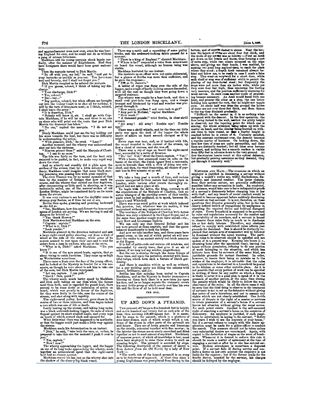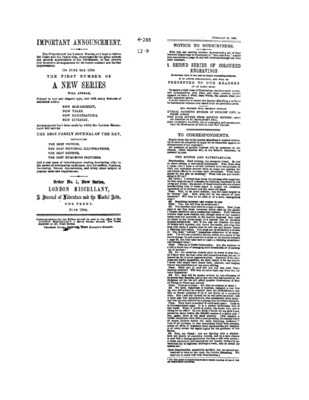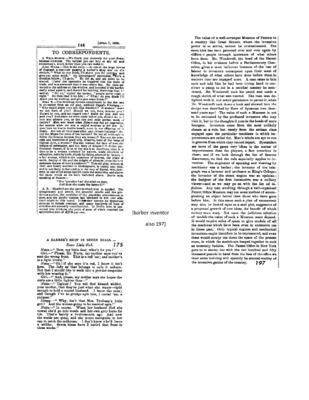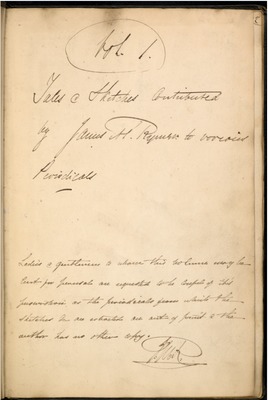Pages
Page 16
ing England for ever, and he could not do so without a pang of intenso bitterness. Markham and the young marquis shook hands cordially, after the manner of Englishmen. Had they been foreigners there would have been great embracing. Then the marquis turned to Dick Martin. "Be off with you, my lad," he said, "and got to your barracks as quickly as you can. You have done well and bravely, and I shall not forget you.”Dick Martin coughed as he saluted the marquis. "If you please, colonel, I think of taking my dis charge." "Your discharge, Dick ?" "Yes, colonel. "But—but—" "Beg pardon, colonel, but when officers are brought out into tho Colour Court to be shot all for nothing-, it will be tho turn of drummers next; so I thiuk, colonel, I shall leave the army." "It is desertion, Dick." “Nobody will know it, sir. I shall go with Captain Markham, if he will let me, and there is no one on shore who will point out the route that poor Dick Martin the drummer has taken." "No one," replied the marquis. "I do not see you." Dimly Markham could just see the boy holding out his arms towards the boat, but there was no difficulty in understanding the action. " With pleasure, Dick," he,cried. "Leap!" Another moment, and the wherry was unmoored and shot out into the darkness. " Heaven protect them!" said the Marquis of Charlton. "I can do no more." The tide was fairly on the turn, and the boat only required to bo guided, in fact, to make very rapid way down the river. And so silently and steadily did it glide upon the surface of the stream that, by a little delusion of the fancy, Markham could imagine that some black moving panorama was passing him with great rapidity. The river Thames was by no means spanned at that time by the number of bridges that now mark its course, and the wherry that carried our four fugitives, after encountering no little peril in shooting, as it was technically called, one of the narrow arches of old London Bridge, might be considered fairly on its route down the stream. It was very curious to see how the daylight came in strange grey flashes, as if from far out at sea. Bertha then spoke, glancing and pointing backward as she did so. " See, Markham, how dim and distant llio houses and spires of London are getting. We are leaving it and all dangers far behind us." "Yes, thank Heaven!" Dick Martin4ouched Markham on the arm, "Captain! caplnin!" "What is it, Dick i" "Look yonder." Markham glanced in the direction indicated and saw a large eight-oared galley shooting out from a kind of wharf at tho sido of the stream, while some of ite rowers seemed to rest upon their oars and to wait for orders from a man in uniform who sat at tho stern. "What is it, Dickr" asked Markham. "Do you know P" " It is one of the new guard-boats, captain, that go about trying to catch Jacobites. They come up as high as Westminster sometimes. There came a tlnsh over the face of the young officer, and he looked at the Mystery in Scarlet for a tew mo ments, as though he wen? about to ask him to take ono of the oars, but Dick Martin interposed. " Let mo, captain. I can pull. t " Quick ! then, quick !" The wherry made much better speed by Markham and Dick each taking an oar than when the former used them both, and as regarded tho guard-boat, thero seemed to bo some doubt or indecision of action on board, which was greatly in favour of the fugitives, for they were fairly in tho tide, near the centre of tho stream, and shot along with rapidity. The eight-oared galley, however, gave chase in tho course of two or three minutes, and then began indeed a race which was one of life or death. Lazily beating up the stream, and taking long tacks, was a black awkward-looking lugger, tho sails of which flapped against its short stunted masts, and every rope on board of which seemed slack and uncarcd for. What littlo wind there was happened to bo northerly, so that the lugger could just make a little way against tho stream. Markham made his determination in an instant. " Dick," he said, "take both the oars, or, rather, bo prepared to take this ono the moment I push it over to you." " Yes, captain." "Now ! now!" The wherry approaching tho lugger, and the lugger on one of its long tacks approaching tho wherry, mado together an accumulated speed that tho eignt-oared boat had no chance against. Mnrkham waved his hat just as the wherry shot into the shadow of the clumsy big black vessel. There was a rattle and a squeaking of some pulley blocks, and the awkward-looking fabric paused for a moment. " Thero is a king of England !" shouted Markham. " Where is he ?" responded a voice from somewhere on board tho vessel, although no human being was visible. Markham hesitated for one instant. His instincts as an officer were not quite obliterated, but a glance at Bertha was more than sufficient, and he gave the response— " N9t at St. James's." A ladder of ropes was flung over the side of the lugger, and a couple of hardy-looking seamen descended, with all tho ease as though they were going down a carpeted staircase. The wherry was caught by a boat-hook, and then a small oval port-hole was flung open, and a visage bronzed and blackened by wind and weather was pro jected through it. " How mush, mynheer P and vero vash to go f" " Any port in Holland," replied Markham. " How mush r" " A thousand pounds !" cried Bertha, in clear shrill accents. "All avay! All avay! Tomblo ups! Tomble ups!" There was a shrill whistle, and by the time our littlo party was upon tho deck of the lugger the whole aspect of affairs on board seemed changed as if by magic. Every rope was taut, and, as if instinct with life, the vessel rounded to the cuiTent of the stream, up flew a cloud of canvass, and she was off. Thero was a cry of rage on board the eight-oared boat, succeeded by a rattle of firearms. " Ha ! ha! Von!" cried the Dutch captain. " Von !" With a boom, that awakened many an echo on the banks of the river, the Dutch lugger fired a carronade, more in bravado than with a view of doing any mis chief, and then, the wind freshening, all chance of pur suit was in live minutes at an end. • • * • • • ■ We tako a leap past a month of time, and various events unexpected m their nature had taken place in London, while various other events thoroughly ex pected had not taken place at all. To begin with the latter, the king, contrary to all the expectations of the Marquis of Charlton, took no notice whatever of the startling events of that terrible night when he had oscillated, so to speak, between St. James's and Whitehall. There was some royal policy at work which induced this inaction, but, whatever was its motive, it was maintained without any apparent evasion. The marriage of the Marquis of Charlton with Agnes Bellair was duly celebrated in tho Chapel Royal, and at the same time another couple were there united—viz., Lucy Kerr and Lieutenant Ogilvie. We can only say that General Bellair and his son were present at these nuptials, and that the queen behaved munificently to both the brides. And now we take another leap, and three years have passed away, at the end of which period we will conduct the reader to an ancient stately red-brick mansion at the Hague. It is full of gable-ends and curious old windows, and surrounded by stately trees, that give it an air of solemn, if we may not say sombre, magnificence. But the sun is shining through the denso foliage of those trees, and upon the parterres, crowded with beau tiful tulips, which form such a feature of Dutch gardening. And there is sunshine within as well as without, for a gay wedding party aio filling the saloons with beauty, brilliancy, and joy. Bertha has that morning been united to Captain Markham, and as the Mystery in Scarlet pronounces a blessing on them both there is a new-born joy upon his face, and he no longer regrets the visionary crown his once feeble grasp at which nearly cost him his own life and the lives of all he held most dear, THE END.
Page 17
p. 288 IMPORTANT ANNOUNCEMENT. The Proprietor of the LONDON MISCELLANY begs to inform the Trade and the Public that, encouraged by the great success and general appreciation of the Publication, he has entered into extensive arrangements for its future conduct and further improvement.
On June the 12th THE FIRST NUMBER OF A NEW SERIES WILL APPEAR, Printed in new and elegant type, and with many features of additional utility. NEW MANAGEMENT, NEW TALES, NEW ILLUSTRATIONS, NEW INTEREST.
Arrangements have been made by which the LONDON MISCELLANY will become THE BEST FAMILY JOURNAL OF THE DAY, CONTAINING THE BEST FICTION, THE BEST PICTORIAL ILLUSTRATIONS, THE BEST RECIPES, THE BEST HUMOROUS SKETCHES, And a vast mass of miscellaneous reading interesting alike to the seeker of information on Science, Art, Inventions, Fashions, Gardening, Games, Amusements, and every other subject of popular taste and requirement.
Order No. 1, New Series, LONDON MISCELLANY, Journal of Literature and the Useful Arts, ONE PENNY. June 12th.
Communications for the Editor should be sent to the LONDON MISCELLANY, 1, Savoy Street, Strand. The Trade supplied at 147, Fleet Street. CHARLES JONES, PRINTER, WEST HARDING STREET.
p. 12
NOTICE TO SUBSCRIBERS. With this, our opening number, is presented a set of Four Coloured Engravings in illustration of “Rich and Poor,” a story that commences at page 16, and will continue through our next three numbers.
A SECOND SERIES OF COLOURED ENGRAVINGS In the best style of art, and on deeply interesting subjects, IS IN ACTIVE PREPARATION, AND WILL BE PRESENTED TO OUR READERS AT AN EARLY DATE. To secure a high class of Illustrations, we have made permanent arrangements with PHIZ, and other eminent Artists engaged on ONCE A WEEK, GOOD WORDS, THE LEISURE HOUR, and other approved serials. OUR COLUMNS WILL SHORTLY CONTAIN SEVERAL PATHETIC STORIES OF ENGLISH LIFE, by Popular Authors, SOME DARK SCENES FROM MODERN HISTORY, called the LEGENDS OF ST. SEPULCHRE’S BELL, SOME CURIOUS PAPERS, full of originality and amusement, upon the MYSTERIES OF OUT-OF-THE-WAY TRADES.
TO CORRESPONDENTS. Nearly every line in the London Miscellany is original writing and we shall be compelled to apply for an injunction against all infringements of our copyright. All questions of general interest will be answered in our columns. Other inquiries will, in the Editor's discretion, be answered by post.
THE EDITOR AND PATERFAMILIAS. Paterfamilias. Good evening, my energetic friend. So you are about editing a new penny publication. Well, there may be room; but I have a certain curiosity as to the ground on which you anticipate success when so many are making the most frantic efforts to increase their circulation. What sympathies do you aim at emulating? What void are you undertaking to fill up? Ed. (drily) I always hear those two phrases with suspicion. The first reminds me of a Society for Inducing Cannibals to Use Knives and Forks: the second, of those lunatics who are always manufacturing tons of waste paper to supply the omissions bequeathed us by Solomon and the other old sages. Pater. Well, to be more definite: you will cater largely in the "fiction" way. Now, what will be the nature of your Romances? Will they be all milk or of a more ensanguined colour? Ed. Something in between—my couleur de rose. Pater. Yes; but will they be sensational? Ed. You mention that word in a tone of alarm. Now, I am happy to say that those romances which rake up the gutter of human depravity are a commercial mistake. Their hideous portraits repel most readers, and, though some of our country cousins may feel qualmish at the horrors depicted, they need only listen to the horse-laugh of a London boy on perusing the same adventures. But, if you ask me whether our tales will bristle with incident, curl round the reader, and drag him along with them, I answer that we will use any known recipe for affecting that object. You must not be deluded by a cuckoo []. The most "correct" magazines endeavour to be sensational. You will see a tenderly devout article by a canon of the Church at page 10, and a learned treatise on the aurora borealis at page 20, but they take care to insert a relishing sensational novel between them! Pater. Then as to Useful Information. Are the matrons to be told a worse way of managing their households, or of cooking a leg of mutton? Ed. No: the press has already done its worst in that line; but I fancy that the best cooks and housewives keep the art in themselves, for it never appears in print. However, if we come across any useful suggestion, we shall record it for the benefit of those who might have better food, raiment, and lodging without the expenditure of one more shilling. Pater. What sort of stuff will you put into our Topographical articles? Will they be mere hash-ups from the old Penny Magazines? Ed. No: they will be mostly written by eye-witnesses of the scenes they describe, and to any one who has worked at the grindstone all his life will afford graphic illustrations of Men and Things at Home and Abroad. Pater. Then as to Jokes: will they be original or select? Ed. We have, regardless of expense, engaged a real live wag, who will always be retained upon the establishment, but liable to fearful penalties if he is not funny at a moment's notice. Him I call Our Invalid, for he will never be cured; but we have also Two Amphitryons, who occasionally show symptoms that are only relieved by a plunge into the Comic Element. Pater. Then there is another ill-cultivated space. Look at the Correspondence page. It is a perfect wilderness—full of real bores. What is Annie is pretty, has flaxen hair, and is waiting for an offer? Do you think I would let my girls haw themselves about before the 500,000 readers of a penny pub.? Then, again, there is the male atrocity. Only imagine a Scottish clergyman with £40 year parading his desolate heart and empty pockets before the same flattering audience!* Worst of all, perhaps, is that abominable fellow with pimples, []tting all sorts of questions when apothecaries are hanging out at every corner red signal-lights for the guidance of the []. Ed. Stop, my friend; you are fighting with a shadow. There are plenty of charming Annies, and by a rare chance you may find a clerical gentleman wanting a wife with money; but there answers to Correspondents are mostly written by an intellectual boy at eighteen shillings a week, and he writes the questions too! [Exit Paterfamilias, apparently satisfied, but, we should say, resolved to keep an eye upon the London Miscellany. We shall try to stand well with Paterfamilias.] --- *For this piece of impertience see a recent number in one of our most respectable confreres.
Page 19
Vol. 1. Tales & Sketches Contributed by James M. Rymer to various Periodicals.
Ladies & gentlemen to whom this volume may be lent for perusal are requested to be careful of this [] as the periodical from which the sketches are extracted are out of print & the author has no other copy. JMR



